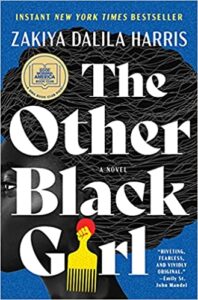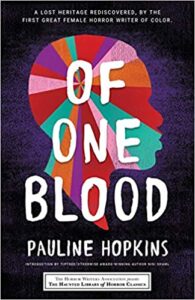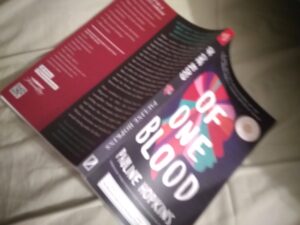The Other Black Girl by Zakiya Dalila Harris
Atria Books, 2021
ISBN-13 : 978-1982160135
Available: Hardcover, paperback, Kindle edition, audiobook ( Bookshop.org | Amazon.com )
Nella is an editorial assistant at Wagner Books, and the only Black woman on the editorial staff. Editorial assistants are poorly paid, and most of the editors have been there for years and aren’t going anywhere, so there isn’t a lot of likelihood of moving up. Most editorial assistants are young white women with a financial cushion that allows them to afford the job, and there is a lot of turnover. Nella faces frequent microaggressions from the lily-white staff. There has been a token effort at diversity and inclusion, but most staff have tuned it out.
Nella is struggling with her supervising editor over the latest book of a well-known author, which includes a racist stereotype, while hoping to bring in a manuscript by a controversial Black activist. As she attempts to balance keeping her job with staying true to herself, she is pleased to discover that Wagner has hired another Black woman as editorial assistant, Hazel. At first Nella is relieved and excited to have someone to vent with, but Hazel comes across as more “genuine” and is an expert code-switcher. Soon Nella finds that Hazel is undermining her and going behind her back to take on what had previously been Nella’s assignments and roles. It’s almost like Nella is becoming invisible. Something ominous is going on. There are occasionally interruptions from other narrators, which is a little confusing, but eventually helps to create an understanding of the larger picture in which Nella’s story exists.
The Other Black Girl is slow to begin, but it is worth it to see the development of the office environment in which Nella and Hazel find themselves competing. Readers who don’t follow publishing news will need this background. As the story progresses, it draws the reader in, and the suspense and growing dread make it impossible to put down. It critiques the whiteness of publishing, the performativity of diversity initiatives, the necessity for code-switching, and stereotypes like the “strong black woman” in the midst of a conspiracy that couldn’t exist in another context. It is a compelling story that pulls back the curtains on the publishing world, showing that there is much more that needs to occur for real diversity and change. Highly recommended.
Reviewed by Kirsten Kowalewski








Follow Us!